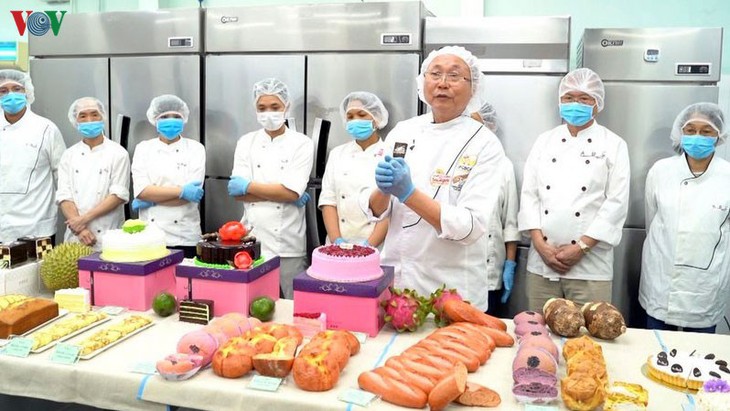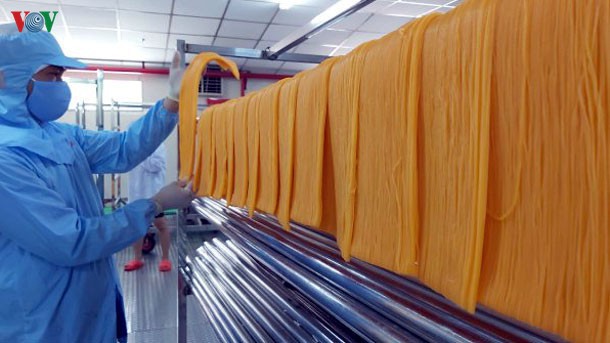(VOVWORLD) - The Covid-19 epidemic is greatly affecting trade between Vietnam and importers of its farm produce, particularly China. Vietnamese food businesses are diversifying their products to satisfy export markets and ensure sustainable growth.

Self-proclaimed ‘king of bread’ Kao Sieu Luc (in the middle) and his products made of dragon fruit and durian
|
When the Covid-19 epidemic broke out and the Vietnam-China border was temporarily closed, dragon fruit and watermelon were the first items to stop being exported to China.
Self-proclaimed ‘king of bread’ Kao Sieu Luc and HCMC-based Duy Anh Foods Export-Import Company use dragon fruit and watermelon in making bread, rice vermicelli, and girdle cakes. The products have been well received and are examples of the creativity that is being seen lately in domestic farm produce processing.
Le Duy Toan, Director of R&D for Duy Anh Foods Export-Import Company, said: “We have been exporting rice products for a long time. In recent years, we have created new items by adding various fruits to our traditional products, giving consumers more options. Our main export items are dried foods and we have received more export orders this year than in the same period last year.”
Xuan Dinh Agricultural Service and Trade Cooperative in Dong Nai province exports durian and rambutan.
Dang Thi Thuy Nga, the cooperative’s Director, said that in addition to its own 750 hectares of durian and rambutan, the cooperative is collaborating with other farmers to grow the fruits on 1,000 hectares in Cam My district.
During the current difficulties caused by the worldwide health crisis, the co-operative has promoted domestic consumption and production of durian ice cream and frozen canned rambutan.
“It has become a rule – if productivity rises, the price will fall. We all want to see a company invest in warehouses and contract with farmers to purchase their produce for processing and storing for later export. This would help farmers feel more secure about production, because farm produce prices are rising day by day,” said Nga.
Many businesses have promoted extensive or “deep” processing of vegetables and fruits when it’s impossible to delay the harvest time. Deep processing vegetables and fruits extends their “shelf life”, diversifies export items, and increases their purchase price.
Dang Phuc Nguyen, Secretary General of the Vietnam Fruit and Vegetable Association, urges businesses to invest in their own production chains to boost exports and not rely so much on government support.
In addition to the Law on Cultivation, Vietnam's agricultural sector needs specific guidelines and policies to establish raw material areas, large agricultural production zones, and cooperatives to collect farm produce.
Nguyen Hong Son, Director of the Vietnam Academy of Agricultural Sciences, said: “The State is in charge of creating policy while businesses should outline investment strategies for advanced production lines, equipment, and warehouses to store the excess produce from bumper crops.
“The current demand for fruit soft drinks is huge but several businesses need to invest in deep processing to meet the demand,” Son added.
 The process to make rice vermicelli from yellow watermelon by Duy Anh Foods Export-Import Company The process to make rice vermicelli from yellow watermelon by Duy Anh Foods Export-Import Company |
Deep processing is considered a sustainable solution for Vietnamese agricultural products. Vietnam’s target is to increase processing capacity 25% a year or 6 million tons of vegetables and fruits.
To that end, domestic processors are being encouraged to upgrade their production methods while the Government helps enterprises to promote cooperation and creates more investment capital incentives.